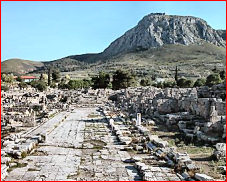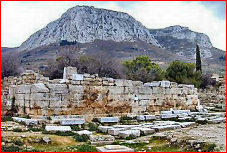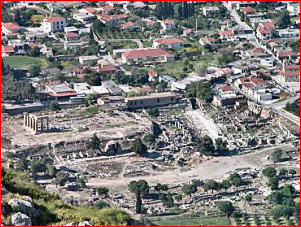"For the weapons of our warfare are not carnal but mighty in God for pulling down strongholds, casting down arguments and every high thing that exalts itself against the knowledge of God, bringing every thought into captivity to the obedience of Christ."
Those words evoked vivid imagery in the minds of the Corinthian believers.
 Acrocorinthus |
 The fortress atop Acrocorinthus |
Paul says, however, that our spiritual weapons are "mighty through God" to the pulling down of such battlements. What are those weapons? The apostle isn't specific here, but it's not hard to discern what he means.
In the first place, since he is talking about an ideological battle, the array of weapons he has in mind must be the instruments of truth and righteousness, starting with the gospel message and the Word of God itself. In the second place, and more specifically, it seems clear that he is speaking of the same apparatus he already mentioned just a few chapters earlier, in 2 Corinthians 6:6-7:
By purity, by knowledge, by longsuffering, by kindness, by the Holy Spirit, by sincere love, by the word of truth, by the power of God, by the armor of righteousness on the right hand and on the left.
There's no need for a Christian employing such weaponry ever to be timid about the truth or to shrink away in the face of false or anti-christian ideologies. We don't need to compromise with such systems, try to find common ground with them, or engage their leading gurus in dialogue as if we might eventually come to some kind of profound agreement. We have weapons powerful enough to tear those strongholds down.
And we need to employ those weapons and keep at the fight as long as people are barricaded in the fortresses. The goal of our battle plan is to bring as many as possible "into captivity . . . to the obedience of Christ."
Be sure you catch what Paul is saying here. Our aim in the spiritual warfare is not to destroy people, but to liberate them. We're following the lead of our captain, who "[did] not come to destroy men's lives, but to save them."
 Acrocorinthus, with the ruins of the Bema (a judge's platform, probably used for everything from tribunal to athletic events) in the foreground |
People who barricade themselves in fortresses of lies and deception are enslaved to their sin and their evil ideologies. Our goal is the liberation of as many of them as possible. And we can't relinquish the fight or ease off until the battle is completely over.
 The ruins of Corinth, seen from atop Acrocorinthus |


32 comments:
Thanks for posting this Phil - I wish more Christians understood this, and understood how serious this is.
Good words.
Phil, way to rally the troops...Now lets go out there and get those guys!
Mike, I had to laugh at your comment, as my 4 year old daughter frequently plays a game she calls "let's get those guys" where she frantically runs around chasing . . . nothing. We still have no idea who "those guys", how she knows when she's "gotten" them or what she does once they are in her possession.
Blue, the illusory "those guys" are probably the purveyors of those infamous generic social evils: alienation, discrimination, and oppression.
That's the really cool thing about hazy politically-correct terminology. It can mean whatever you want it to mean.
People who barricade themselves in fortresses of lies and deception are enslaved to their sin and their evil ideologies.
Ahh, but which is the cause and which is the effect?
I think we can sum up the spiritual warfare debate with these simple mottos:
"This one comes out with prayer, fasting and the business end of an AK-47"
or
"We battle not against flesh and blood, but against the 7-11 clerk who won't take foodsatmps for cigarettes and beer"
Wow, Phil. Your analysis is so penetrating and multi-layered. Wait . . . that's the same line you give for everything you disagree with. You forgot to use the word "pomo", though.
Thanks once again for blowing my mind.
You're killing, me Marc! By the way, you're "you supply the caption" feature at Purgatorio is brilliant. Keep up the weird work.
Too kind Raja. Remember, amongst all the weirdness, there may be an occasional point.
I noticed that! Because that's the case, I recently added you to the blogroll over at the most frequented site on the dubya dubya dubya, Soylent Green .
Thanks for the fascinating and pertinent background info on Corinth exalted things and high places!
"Powerful Weapons" is a theme in 2Cor that is as critical for our time. We can (and should) go even further in identifying the nature of these weapons that bring down strongholds.
2Cor's ironic play on the word "glory" with its multiple meanings (strengh, reputation, beauty, worship, etc) is at the heart of taking on these towers. Paul saw his own suffering and "weakness" as critical to ironic display of the power of God.
It seems to me the contemporary church far too enamored with expressions of worldly power to manifest the power of God through truth and suffering that inevitably comes with it.
Blue: "Wait . . . that's the same line you give for everything you disagree with."
Fortunately, the criticisms I get aren't particularly inventive or "multi-layered," either. If my antagonists ever had an original thought, I might be in trouble.
Dunno what happened with the word "pomo" there, though. My computer must've frozen up before the macro finished inserting text. I'll be sure to get that fixed before you deconstruct my next comment.
If you can find some bumper sticker matras that I use ad nauseum in my posts in order to avoid dealing with the arguments, I'd honestly appreciate the critique. The thing is, you haven't dealt with any of the verses I've mentioned. You haven't said anything about the issues of continuity with the OT or the themes of Divine warrior, or comparisons with Israel's spiritual warfare, or the household code context of Eph. 6, or the idea of "the new man" as a Spirit-ordered alternative kingdom (and therefore a political entity), or the idea that sin involves more than just cognitive realms to include disease and poverty, etc. You haven't provided any substantial response to ANY of that. It's just, "Pfffft! We've all heard THAT before!" I'm not looking to be right - but it's hard to see how I'm wrong with those kinds of responses.
So, here's another chance for you to actually respond helpfully:
What's so vague or PC about describing the social devestation of sin? Oppression, alienation and discrimination are just manifestations of rebellion against God's design. The word "oppression" is used in the Bible some 97 times, and speaks not only of violence but even of economic injustice (cf. Ezk. 12:12). Discrimination is the evil and unust favoring of one person, group or people over another - a practice the prophets constantly decry, and James picks up in 2:1-9. Alienation describes the estrangement from God and one another that sin causes - are you saying that these aren't biblical themes, or that if a phenomena is social and structural it's somehow not sin or not worthy of addressing?
Do you believe that God's only interested in individuals and their afterlife? But if that's the case, why does he rebuke, exhort and judge nations? Why is his concern about this worldly justice in these things, and in laws like Ex. 22:25, Det. 15:22, Lev. 25:35, etc.? Why did He rebuke pagan nation states for slave trade (Am. 1:6) and war crimes (Am. 1:13, Mic. 2:1)? Why judge His own people for capitalistic exploitation (Am. 2:6) and other assorted acts of oppression (Am. 2:9)?
I know you've got to care about this stuff Phil -- you don't want children to starve to death or go without medical care, women to be brutalized through genital mutilation, or entire people groups to be destroyed through genocide anymore than anyone else. And of course you have the same interest in their earthly well-being (in addition to their spiritual well-being) as you would your own unsaved relatives. Knowing that, I just don't get your blanket dismissal of these things as "PC" or "Marxist". They're not "hazy", "illusory" or "generic" concerns. Most of the world don't live in Disneyland like we do . The affirmation of Paul as the "apostle to the Gentiles" by the other apostles came with a singular concern: to remember the poor (Gal. 2:10). This isn't the first time you've read those verses I mentioned.
So how do these verses fit into your understanding of evil, the Devil, and how Christians should fight it? How does it fit with your understanding of the Gospel? How does our spiritual warfare compare/contrast with Israel's?
Are you going to post about generational cursings as well? I've been looking for some good ammo on that.
Be sure you catch what Paul is saying here. Our aim in the spiritual warfare is not to destroy people, but to liberate them. We're following the lead of our captain, who "[did] not come to destroy men's lives, but to save them.
Awesome stuff, Phil. I couldn't agree with you more.
Brad
Hey Raja,
I wish I lived in Idaho! (I think)
Don't know how this all ties into the discussion, but here goes:
I presently pastor a church (I came on about a year ago)that prides itself on being socially aware and active. The denomination is well known for being one of the first on the scene of natural disasters, as well as the last to leave. Words like peace and social justice are part of the everyday vocabualary.
And the personal lives of most of these people is absolutely a mess. They have, for all intents and purposes, ignored the true purpose and usefulness of the Word(2 Tim 3:16). I have been utterly amazed to see how the core of supposed leaders has fallen like flies, one by one, consumed with their own inabilty to deal with sin, shallowness of faith, and inability to live according to the full counsel of God.
Perhaps I'm returning to the question of primacy, but I agree with Phil that one must proceed the other. I do believe, though, that many evangelicals have fallen in love with the knowledge aspect of Christianity, while ignoring the action side of faith. The truth is, IMHO, that most American Christians are very cold and indifferent towards any social concern. How difficult is it to find a flock that has individuals regularly visit a prison, homeless shelter or rescue mission? That would cramp our "style". We are more likely to be found roaming the halls of our local Christian bookstore searching for some gizmo emblazoned with a verse or Christian sentiment.
TheBlueRaja: Read rule 1. If I come on your blog and comment, then you get to deride me about whether I've taken you seriously enough or not. Here, I get to decide the amount of words I'll invest in a given discussion, as well as the number and nature of the rabbit trails I want to let the discussion follow.
The bumper sticker mantra that you use ad nauseum in your comments (starting practically with your earliest appearance here) is a snort of sneering contempt for anyone who isn't intellectually sophisticated enough to bow in instant admiration for the multilayered and penetrating analyses you offer—while you yourself misconstrue and oversimplify the position you are thumbing your nose at. For example—
"What's so vague or PC about describing the social devestation of sin?"
I never said it's vague or PC "to describe" the social devastation of sin. What I complained about was the superficial way you did this—boiling unrighteousness down to a handful of pet social issues like "oppression," "discrimination," and alienation," with no reference to other equally devastating social effects of sin, such as unbridled immorality, disease, ignorance, and whatnot—not to mention saccharine religion.
Phil thanks. The description of the Acrocorinthus is very helpful to understanding the context of that passage, and I don't think too many modern folk know about that. (I didn't). Where did you obtain those pictures by the way? That would be helpful for a Sunday School class, etc.
Northsiders in '06!
Jeremy, these pictures I got by doing a Google search. I visited Corinth a decade ago, and I took my own pictures, but they're in a box in the garage somewhere.
Acrocorinth is much more imposing in person, BTW. The pictures don't really do it justice.
Ditto on the Cubs. Wait 'till next year.
Phil,
I never asked for your admiration. I didn't even demmand that you deal with my comments until you criticized them as being a "works vs. faith" issue, which I thought missed my point.
I reread all of my posts and confess that I have no idea where I "thumbed my nose" at anything. I offered a positive contribution (not a critique), and YOU thumbed your nose at THAT (which is your prerogative, of course). I was merely responding to your criticisms; and when I did, I was only expecting you to take my answers to your criticims seriously before continuing to write off my comments as "vague, Marxist, liberal, PC, social-gospel, leftist drivel". But instead of reading my responses to you, and taking them seriously, you continued undaunted with the same line of criticism while ignoring my previous responses.
For the record, I didn't pick some pet social issues to defend -- I put the big, broad topic of social concern on the table for consideration under the rubric of spiritual warfare. The words you mentioned (oppression, alienation, etc) were from the Lausanne mission statement, which I used to illustrate my point. You responded by rejecting the principles stated therein as "PC and Marxist", but commending the building of schools and hospitals, as strangely non-PC and Marxist.
But, recognizing that this is your blog, and that you can do whatever you want with it, I bow in humble deferrence to Rule Number 1. Now that I have the Midrash of this exchange to help understand it, I'll know that in the future any of your criticisms of my comments, sarcastic remarks, and smug retorts should be met with shrugged shoulders and silent befuddlement.
I'm not trying to be a smarty pants or a know-it-all. The problem is that when you blast my contributions to the topic, and I try to defend my comments, it's easily characterized that way.
While Mr. Johnson effectively makes his point about spiritual warfare being primarily an ideological battle using 2 Corinthians 6:6-7, 10:3-5, and Romans 6:17-18, my thoughts turned to Romans 12:1-2:
I appeal to you therefore, brothers, by the mercies of God, to present your bodies as a living sacrifice, holy and acceptable to God, which is your spiritual worship. Do not be conformed to this world, but be transformed by the renewal of your mind, that by testing you may discern what is the will of God, what is good and acceptable and perfect. (ESV, italics added)
When Mr. Johnson mentions the “false religions, faulty worldviews, malignant philosophies, and evil belief systems-the fortresses of lies, deceptions, and unbiblical ideologies Christians are supposed to be waging war against” he is referencing the renewal of a Christian’s mind that begins with regeneration (initial sanctification happening at the same time as justification) and continues throughout the Christian’s remaining time on earth (the process of sanctification that continues). While the Holy Spirit is responsible for this process of mind renewal, He works through human teachers who proclaim the truths about spiritual warfare revealed in Scripture.
Given that a sane person acts in a manner consistent with his/her beliefs and desires. A renewed mind brings with it new beliefs and desires. These new beliefs and desires, then, result in a new manner of acting. This is consistent with the Christian offering his/her body as a living sacrifice. The logical order is inescapable, the actions that theblueraja desires out of Christians are a consequence of a renewed mind.
Do modern-day Christians (in America, in particular, and in the west, in general) care too little about justice, poverty and the like? Yes, but in this regard, they are all too similar to Old Testament Israel. Prophets such as Amos, Isaiah and Micah were called by God to (at least in part) hold Israel accountable for caring too little about justice, poverty and the like. This, however, has not been the point of Mr. Johnson’s posts on Tuesday and Thursday. Mr. Johnson has clearly communicated that his concern in these posts is with mind renewal, with understanding spiritual warfare from the perspective of Scripture. The Lord willing, there will be other days for Mr. Johnson to post on Christians offering their bodies as living sacrifices.
As a college professor (in the more pedestrian areas of accounting, economics and finance) I appreciate the clear and concise manner with which Mr. Johnson crafts his posts. The care and thought that goes into Mr. Johnson’s posts is clearly evident. With regard to comments offered by theblueraja I wish I could say the same. While I put forth a good faith effort to grasp the points he is trying to communicate, I have a very difficult time doing so. For better or worse, the best idea in the world, if it’s not clearly communicated, is like the tree that no one hears when it falls in the forest. It doesn’t really make any noise.
Thanks, farmboy. Point taken. I thought my initial comment to be a fairly uncontroversial contribution, and responded defensively in finding that it proved to be controversial. I'll try to stay more on topic in any future comments. Accept my apologies (you too, Phil).
It is to be hoped that you will restrict this warfare to theological discussions.
It has been my experience that jesus worshippers often use the bible as a weapon to pursue their personal vendettas. Yes, jesus is an excellent weapon when you want to hurt your neighbor.
Raja: I'm sorry to frustrate you, too. I did appreciate your initial feedback.
For the record (and not for the first time), I did not say I reject "the principles stated [by Lausanne] as 'PC and Marxist.'"
I do, however, reject the the reductionistic language that attempts to summarize the Christian's whole duty with regard to "social engagement" and "justice" with a handful of pet words and catch-phrases that have been popularized (and to some degree redefined) by Marxists and the PC police.
(It's true that I don't think it reflects a particularly sound and biblical concept of "justice" to automatically write off "all forms of discrimination" as evil. But putting the best possible spin on what the drafters of Lausanne might have actually had in mind, I'll give them the benefit of the doubt before rejecting their "principles" out of hand.)
I realize the complaint about PC language itself seems churlish and unenlightened to those who think such language is the vernacular of true refinement, but I am, after all, a bit of a bumpkin by the standards of the folks who made those rules, and I'm quite happy to play the game with the meagre hand I have been dealt.
BTW, Raja, I'm driving up to the Bay area with Darlene this afternoon, and I've made a CD of a sermon you preached, which I downloaded from your church's website. I'll play it on the way up. I'm looking forward to hearing you preach.
Phil, I find your posts challenging and insightful. I like to read the comments too ... they are sometimes insightful, but usually hold great entertainment value for me! (Blueraja and Farmboy ... LOL)
Thanks, Phil. I'm right there with you about the reductionism of the Gospel to social concerns, and I'm totally nauseated by the Niebhurian baptized socialism that passes for Christian "political engagement". I'm equally nauseated by the sentimentality and the brainless laziness of political correctness. It's just that sometimes I find those who complain about PC language to be equally lazy in their complaints.
I can't believe you'd waste time listening to me preach, seeing how I can't even write with any clarity. God help my greenness in the pulpit - I'll be the first to say that I'm not very good at it. If you hear any heresy, assume it's just stupidity or inadequate expression. In any case, I hope you'll still respect me in the morning.
I hope you have a good time with Darlene on your way to the Bay area. If you see someone stranded on the side of the road on your way, be sure to slow down, roll down the window and huck a tract for Jesus (that's a joke)!
See, even my jokes aren't that funny. I have to label them.
I hope it's helpful, but honestly, without any false humility, my preaching is pretty shabby.
I listened to to those sermons a couple weeks ago. I was a little dissapointed the The Blue Raja sounded more like the teenager who delivers my Pizza than Apu from the Simpsons, but after getting over my cultural stereotypying I found them quite good.
Yeah. I'm a 29 year old hairy man and I sound like I'm a nine year old girl with a sore throat.
If I had a radio voice, you think I'd be blogging?
Someone asked earlier about generational curses. Are you going to post about them?
"Two days ago, before we got interrupted by the atonement debate [...]"
Huh? Isn't the atonement debate an example of the kind of stronghold that needs to be pulled down? It wasn't an interruption, but a lesson in and of itself.
Jeremy,
Regarding the Corinth photos, 3 of the 4 are from the Pictorial Library of Bible Lands at www.BiblePlaces.com. The purpose of that collection is just what Jeremy thinks that they would be good for - teaching the Bible. Phil, I appreciate your excellent insights.
Post a Comment